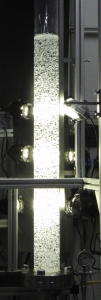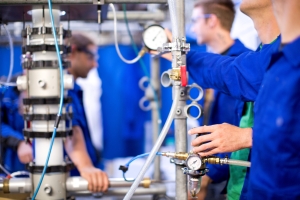To reduce the consumption of fossil materials in the future, renewable resources are planned to supply basic substances for chemical industry. Karlsruhe Institute of Technology (KIT) now cooperates with research institutions and industry partners to study potential uses of the carbon contained in biomass and of the carbon dioxide arising as a by-product in industrial production. The project is aimed at developing a novel process chain for the synthesis of the basic chemical substance methanol. The OptiMeOH collaboration is funded by the Federal Ministry of Education and Research (BMBF) with EUR 1.4 million.
The energy turnaround has already given rise to a number of carbon-free alternatives for the production of power and heat. Chemical industry, however, will continue to depend on carbon for producing its products. As biomass is a sustainable carbon source available all around the globe, it might be used to cover part of the demand of chemical industry. In particular, use of organic residues from industry and municipal waste management services is considered. Researchers of KIT, DVGW (German Technical and Scientific Association for Gas and Water) test laboratory, Stuttgart University, and TU Kaiserslautern, in cooperation with three industry partners, have now launched the project “Optimized process chain for resource-efficient methanol synthesis – OptiMeOH.” They plan to develop an innovative process chain for the synthesis of methanol either without the use of fossil resources or by reusing carbon dioxide from undesired by-product streams in industry. “Carbon utilization and resource efficiency will be improved considerably in this way,” Dr.-Ing. Siegfried Bajohr says. He heads the Catalytic Fuel Conversion Unit of the Engler-Bunte Institute of KIT.
Methanol is an important basic material in chemical industry. It consists of one carbon, one oxygen, and four hydrogen atoms and can be used in many ways, e.g. for the production of formic and acetic acid, formaldehyde, as well as of varnishes and paints. In 2015, worldwide consumption of methanol amounted to about 65 million tons.

A bubble column is part of the setup, by means of which carbon dioxide from biomass and exhaust gases of chemical industry is to be utilized as a carbon source. (Photo: KIT)
The OptiMeOH project is scheduled to have a duration until the end of 2019. With its help, methanol of fossil origin is to be replaced partly by “renewable” methanol. It is funded with about EUR 1.4 million by the Federal Ministry of Education and Research under the funding initiative “CO2Plus – Stoffliche Nutzung von CO2 zur Verbreiterung der Rohstoffbasis” (CO2Plus – Utilization of CO2 for Broadening the Raw Material Base). In addition, about 300,000 Euros will be provided by the industry partners, such that the total budget of the research project amounts to about EUR 1.7 million.
Theoretical and experimental studies among others will focus on energy-efficient biogas production by high-pressure fermentation. The biomass is planned to be fermented at pressures of 30 bar and higher. In addition, a novel reactor concept will be developed for methanol synthesis and an innovative process will be designed for processing industry gases by chemical gas scrubbing with ionic fluids.
“It is one of our main tasks to study the reduction of greenhouse gas emissions that can be achieved by technical improvements,” chemical engineer Nike Trudel of KIT says. The new process chain will be compared to established processes and assessed with respect to various economic and ecological factors. A feasibility study will cover use of this technology at two different locations, a big industrial park and a decentralized facility. “The process will be analyzed holistically, its efficiency and ecobalance will be compared to those of methanol production processes based on coal, oil or natural gas,” Bajohr adds.
The OptiMeOH project group consists of research institutes and industry partners at a 50:50 ratio. The project partners are the KIT with its Engler-Bunte Institute and its DVGW test laboratory, Stuttgart University with its Holistic Balancing Unit of the Department of Building Physics, and TU Kaiserslautern with its Chair of Separation Science and Technology. The industry partners are Ifraserv GmbH & Co., Höchst KG that operates the Industriepark Höchst in Frankfurt/Main, Mitsubishi Hitachi Power Systems Europe, Duisburg, which has specialized in plant construction, and keep it green, a planning and project office in Starnberg, which focuses on feeding regenerative gases into the public grid and on new technologies to improve carbon utilization for biomass conversion.
In close partnership with society, KIT develops solutions for urgent challenges – from climate change, energy transition and sustainable use of natural resources to artificial intelligence, sovereignty and an aging population. As The University in the Helmholtz Association, KIT unites scientific excellence from insight to application-driven research under one roof – and is thus in a unique position to drive this transformation. As a University of Excellence, KIT offers its more than 10,000 employees and 22,800 students outstanding opportunities to shape a sustainable and resilient future. KIT – Science for Impact.

